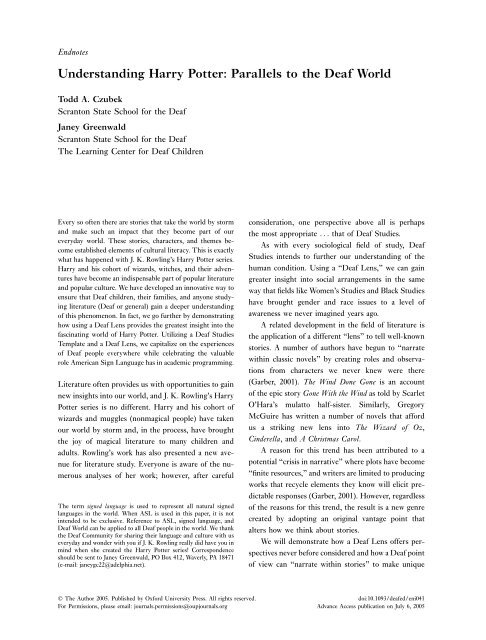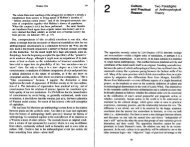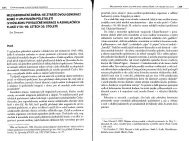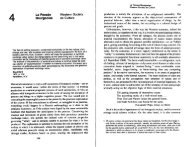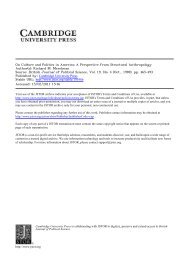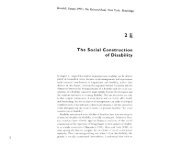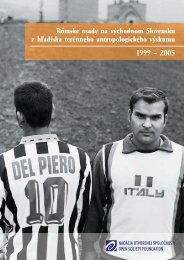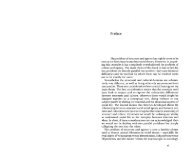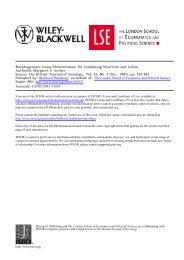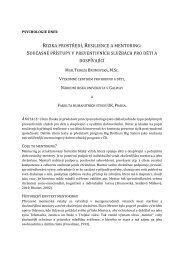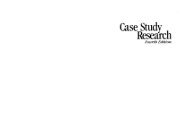Understanding Harry Potter: Parallels to the Deaf World - Moodle
Understanding Harry Potter: Parallels to the Deaf World - Moodle
Understanding Harry Potter: Parallels to the Deaf World - Moodle
Create successful ePaper yourself
Turn your PDF publications into a flip-book with our unique Google optimized e-Paper software.
Endnotes<br />
<strong>Understanding</strong> <strong>Harry</strong> <strong>Potter</strong>: <strong>Parallels</strong> <strong>to</strong> <strong>the</strong> <strong>Deaf</strong> <strong>World</strong><br />
Todd A. Czubek<br />
Scran<strong>to</strong>n State School for <strong>the</strong> <strong>Deaf</strong><br />
Janey Greenwald<br />
Scran<strong>to</strong>n State School for <strong>the</strong> <strong>Deaf</strong><br />
The Learning Center for <strong>Deaf</strong> Children<br />
Every so often <strong>the</strong>re are s<strong>to</strong>ries that take <strong>the</strong> world by s<strong>to</strong>rm<br />
and make such an impact that <strong>the</strong>y become part of our<br />
everyday world. These s<strong>to</strong>ries, characters, and <strong>the</strong>mes become<br />
established elements of cultural literacy. This is exactly<br />
what has happened with J. K. Rowling’s <strong>Harry</strong> <strong>Potter</strong> series.<br />
<strong>Harry</strong> and his cohort of wizards, witches, and <strong>the</strong>ir adventures<br />
have become an indispensable part of popular literature<br />
and popular culture. We have developed an innovative way <strong>to</strong><br />
ensure that <strong>Deaf</strong> children, <strong>the</strong>ir families, and anyone studying<br />
literature (<strong>Deaf</strong> or general) gain a deeper understanding<br />
of this phenomenon. In fact, we go fur<strong>the</strong>r by demonstrating<br />
how using a <strong>Deaf</strong> Lens provides <strong>the</strong> greatest insight in<strong>to</strong> <strong>the</strong><br />
fascinating world of <strong>Harry</strong> <strong>Potter</strong>. Utilizing a <strong>Deaf</strong> Studies<br />
Template and a <strong>Deaf</strong> Lens, we capitalize on <strong>the</strong> experiences<br />
of <strong>Deaf</strong> people everywhere while celebrating <strong>the</strong> valuable<br />
role American Sign Language has in academic programming.<br />
Literature often provides us with opportunities <strong>to</strong> gain<br />
new insights in<strong>to</strong> our world, and J. K. Rowling’s <strong>Harry</strong><br />
<strong>Potter</strong> series is no different. <strong>Harry</strong> and his cohort of<br />
wizards and muggles (nonmagical people) have taken<br />
our world by s<strong>to</strong>rm and, in <strong>the</strong> process, have brought<br />
<strong>the</strong> joy of magical literature <strong>to</strong> many children and<br />
adults. Rowling’s work has also presented a new avenue<br />
for literature study. Everyone is aware of <strong>the</strong> numerous<br />
analyses of her work; however, after careful<br />
The term signed language is used <strong>to</strong> represent all natural signed<br />
languages in <strong>the</strong> world. When ASL is used in this paper, it is not<br />
intended <strong>to</strong> be exclusive. Reference <strong>to</strong> ASL, signed language, and<br />
<strong>Deaf</strong> <strong>World</strong> can be applied <strong>to</strong> all <strong>Deaf</strong> people in <strong>the</strong> world. We thank<br />
<strong>the</strong> <strong>Deaf</strong> Community for sharing <strong>the</strong>ir language and culture with us<br />
everyday and wonder with you if J. K. Rowling really did have you in<br />
mind when she created <strong>the</strong> <strong>Harry</strong> <strong>Potter</strong> series! Correspondence<br />
should be sent <strong>to</strong> Janey Greenwald, PO Box 412, Waverly, PA 18471<br />
(e-mail: janeygc22@adelphia.net).<br />
consideration, one perspective above all is perhaps<br />
<strong>the</strong> most appropriate ... that of <strong>Deaf</strong> Studies.<br />
As with every sociological field of study, <strong>Deaf</strong><br />
Studies intends <strong>to</strong> fur<strong>the</strong>r our understanding of <strong>the</strong><br />
human condition. Using a ‘‘<strong>Deaf</strong> Lens,’’ we can gain<br />
greater insight in<strong>to</strong> social arrangements in <strong>the</strong> same<br />
way that fields like Women’s Studies and Black Studies<br />
have brought gender and race issues <strong>to</strong> a level of<br />
awareness we never imagined years ago.<br />
A related development in <strong>the</strong> field of literature is<br />
<strong>the</strong> application of a different ‘‘lens’’ <strong>to</strong> tell well-known<br />
s<strong>to</strong>ries. A number of authors have begun <strong>to</strong> ‘‘narrate<br />
within classic novels’’ by creating roles and observations<br />
from characters we never knew were <strong>the</strong>re<br />
(Garber, 2001). The Wind Done Gone is an account<br />
of <strong>the</strong> epic s<strong>to</strong>ry Gone With <strong>the</strong> Wind as <strong>to</strong>ld by Scarlet<br />
O’Hara’s mulat<strong>to</strong> half-sister. Similarly, Gregory<br />
McGuire has written a number of novels that afford<br />
us a striking new lens in<strong>to</strong> The Wizard of Oz,<br />
Cinderella, and A Christmas Carol.<br />
A reason for this trend has been attributed <strong>to</strong> a<br />
potential ‘‘crisis in narrative’’ where plots have become<br />
‘‘finite resources,’’ and writers are limited <strong>to</strong> producing<br />
works that recycle elements <strong>the</strong>y know will elicit predictable<br />
responses (Garber, 2001). However, regardless<br />
of <strong>the</strong> reasons for this trend, <strong>the</strong> result is a new genre<br />
created by adopting an original vantage point that<br />
alters how we think about s<strong>to</strong>ries.<br />
We will demonstrate how a <strong>Deaf</strong> Lens offers perspectives<br />
never before considered and how a <strong>Deaf</strong> point<br />
of view can ‘‘narrate within s<strong>to</strong>ries’’ <strong>to</strong> make unique<br />
Ó The Author 2005. Published by Oxford University Press. All rights reserved.<br />
doi:10.1093/deafed/eni041<br />
For Permissions, please email: journals.permissions@oupjournals.org Advance Access publication on July 6, 2005
Endnotes 443<br />
observations that contribute <strong>to</strong> our appreciation of literature<br />
and <strong>the</strong> human condition. In order <strong>to</strong> do this we<br />
have developed a ‘‘<strong>Deaf</strong> Studies Template’’ (Czubek &<br />
Greenwald, 2000). The template uses <strong>the</strong> following<br />
categories for literature analysis: Only in <strong>the</strong> <strong>Deaf</strong> <strong>World</strong>,<br />
Minority Issues (including Identity and Oppression),<br />
Institutions, and, finally, Edenic Narrative.<br />
Using this template we have identified remarkable<br />
parallels between <strong>Harry</strong> <strong>Potter</strong>’s world and <strong>the</strong> <strong>Deaf</strong><br />
<strong>World</strong>, effectively changing how we look at <strong>the</strong> <strong>Harry</strong><br />
<strong>Potter</strong> series and all literature. The template is a <strong>to</strong>ol<br />
that helps organize elements of s<strong>to</strong>ries and relate <strong>the</strong>m<br />
<strong>to</strong> common <strong>the</strong>mes from <strong>the</strong> <strong>Deaf</strong> <strong>World</strong>. By following<br />
this model, students can begin <strong>to</strong> look for particular<br />
<strong>the</strong>mes in literature, analyzing narratives according <strong>to</strong><br />
<strong>the</strong> four categories outlined above. The categories are<br />
by no means exhaustive, and students are encouraged<br />
<strong>to</strong> expand and create additional ideas of <strong>the</strong>ir own.<br />
The template is designed <strong>to</strong> assist <strong>the</strong>m with comprehensive<br />
literary analyses as <strong>the</strong>y read, using <strong>the</strong>ir own<br />
lives, experiences, and cultures.<br />
Only in <strong>the</strong> <strong>Deaf</strong> <strong>World</strong><br />
This category describes events and experiences that<br />
illustrate distinctive features of life in <strong>the</strong> <strong>Deaf</strong> <strong>World</strong>.<br />
Though <strong>the</strong>re are many parallels between <strong>the</strong> experiences<br />
of <strong>Deaf</strong> people and o<strong>the</strong>r minority groups, <strong>the</strong><br />
following section highlights examples specific <strong>to</strong> <strong>the</strong><br />
<strong>Deaf</strong> <strong>World</strong>.<br />
Unique <strong>to</strong> <strong>the</strong> <strong>Deaf</strong> <strong>World</strong> is <strong>the</strong> phenomenon that<br />
approximately 95% of deaf children are born <strong>to</strong> hearing<br />
parents (Mitchell & Karchmer, 2004). This creates a situation<br />
in which parents and children do not share a language<br />
and culture based on heredity, as is <strong>the</strong> case with<br />
every o<strong>the</strong>r biological family. Hearing parents typically<br />
have not had contact and/or experience with <strong>Deaf</strong> people<br />
and, in many cases, have never met a deaf person.<br />
Similarly, in <strong>the</strong> world of <strong>Harry</strong> <strong>Potter</strong>, wizard children<br />
are born <strong>to</strong> muggle parents and muggle children are<br />
born <strong>to</strong> wizard parents. We believe that <strong>the</strong> <strong>Deaf</strong> <strong>World</strong><br />
is <strong>the</strong> only group in which this occurs. Every o<strong>the</strong>r<br />
minority group has ‘‘minority babies’’ who are ‘‘like<br />
<strong>the</strong>ir parents’’ in terms of language and culture.<br />
Often, deaf children of hearing parents (DCHP),<br />
due <strong>to</strong> innocent parental ignorance or intentional motives,<br />
are not exposed <strong>to</strong> <strong>the</strong> <strong>Deaf</strong> <strong>World</strong> as <strong>the</strong>y are<br />
growing up. We have often seen deaf children comment<br />
that <strong>the</strong>y will become hearing when <strong>the</strong>y turn 18 years<br />
old. <strong>Deaf</strong> children who do not have exposure <strong>to</strong> <strong>Deaf</strong><br />
adults and <strong>the</strong> <strong>Deaf</strong> Community assume that at a certain<br />
age <strong>the</strong>y will become hearing because <strong>the</strong>y have never<br />
seen a deaf person older than <strong>the</strong> students in <strong>the</strong>ir<br />
schools. <strong>Harry</strong> <strong>Potter</strong> also grows up without any idea<br />
about <strong>the</strong> Wizard <strong>World</strong> and who he really is. <strong>Harry</strong>’s<br />
guardians, Aunt Petunia and Uncle Vernon, purposely<br />
deny him information about <strong>the</strong> Wizard <strong>World</strong> and his<br />
heritage. <strong>Deaf</strong> children and <strong>Harry</strong> grow up feeling<br />
alone and ‘‘different’’ than everyone around <strong>the</strong>m without<br />
understanding why. This leaves a tremendous void<br />
in <strong>the</strong>ir lives and highlights <strong>the</strong> critical nature of access<br />
<strong>to</strong> information, language, and <strong>the</strong> truth.<br />
<strong>Deaf</strong> children growing up in hearing families are<br />
often left out of family dynamics for a variety of reasons.<br />
This is also true for <strong>Harry</strong> as he is isolated and<br />
excluded as opposed <strong>to</strong> Dudley, <strong>the</strong> treasured muggle<br />
son of Aunt Petunia and Uncle Vernon, who is included<br />
and knows about everything in <strong>the</strong> family.<br />
On <strong>the</strong> o<strong>the</strong>r hand, <strong>the</strong>re are often cases where<br />
deaf children reportedly ‘‘get more attention’’ from<br />
<strong>the</strong>ir parents and families than <strong>the</strong>ir hearing siblings<br />
do for a number of reasons. Petunia Dursley expressed<br />
<strong>the</strong> same concern when she talked about how her<br />
parents gave more attention <strong>to</strong> her sister, Lily <strong>Potter</strong>,<br />
<strong>the</strong> wizard, than <strong>to</strong> her as <strong>the</strong>y grew up.<br />
<strong>Harry</strong>’s aunt and uncle feel ashamed about having<br />
a wizard in <strong>the</strong> family. Nei<strong>the</strong>r do <strong>the</strong>y acknowledge<br />
<strong>Harry</strong>’s wizardry nor do <strong>the</strong>y speak of Lily and James<br />
<strong>Potter</strong> (<strong>Harry</strong>’s wizard parents). This is often <strong>the</strong> case<br />
for a deaf child in a hearing family.<br />
The idea of normalcy and <strong>the</strong> quest for making<br />
children ‘‘normal’’ is a common <strong>the</strong>me resonating<br />
throughout all <strong>the</strong> Rowling books. <strong>Deaf</strong> people constantly<br />
confront <strong>the</strong> pathological/audist view that <strong>the</strong>y<br />
are a handicapped, abnormal population in need of ‘‘fixing.’’<br />
There are many examples of <strong>the</strong> Dursleys trying<br />
<strong>to</strong> make <strong>Harry</strong> in<strong>to</strong> something he is not. For example,<br />
‘‘we swore when we <strong>to</strong>ok him in we’d put a s<strong>to</strong>p <strong>to</strong> that<br />
rubbish—swore we’d stamp it out of him’’ (Rowling,<br />
1997). This parallels <strong>the</strong> experience <strong>Deaf</strong> children<br />
may confront when <strong>the</strong>ir families opt for cochlear implants<br />
and refuse signing and o<strong>the</strong>r measures, intending
444 Journal of <strong>Deaf</strong> Studies and <strong>Deaf</strong> Education 10:4 Fall 2005<br />
<strong>to</strong> deny <strong>the</strong>ir deafness. However, as in <strong>the</strong> <strong>Deaf</strong> and<br />
Wizard <strong>World</strong>s, this is not possible. No matter how hard<br />
people try <strong>to</strong> ignore <strong>the</strong> culture, language, and power of<br />
a strong community, it does not disappear.<br />
The Dursleys’ attempts <strong>to</strong> hide <strong>Harry</strong> from <strong>the</strong> Wizard<br />
<strong>World</strong> by bringing him <strong>to</strong> various obscure locations<br />
are closely analogous <strong>to</strong> those of parents obstructing<br />
<strong>the</strong>ir children’s exposure <strong>to</strong> <strong>the</strong> <strong>Deaf</strong> <strong>World</strong>. Hagrid,<br />
<strong>the</strong> representative of <strong>the</strong> Wizard <strong>World</strong> and Hogwarts<br />
School, finds <strong>Harry</strong> no matter where <strong>the</strong> Dursleys try <strong>to</strong><br />
hide him. This again parallels <strong>the</strong> cohesiveness of <strong>the</strong><br />
<strong>Deaf</strong> <strong>World</strong> and <strong>the</strong> fact that <strong>Deaf</strong> people will find <strong>the</strong><br />
<strong>Deaf</strong> Community or be found! There are many s<strong>to</strong>ries<br />
about ‘‘seekers’’ in <strong>the</strong> <strong>Deaf</strong> <strong>World</strong>; those people who<br />
literally ‘‘searched’’ for <strong>Deaf</strong> children in order <strong>to</strong> bring<br />
<strong>the</strong>m <strong>to</strong> schools for <strong>the</strong> <strong>Deaf</strong>. Before <strong>the</strong> age of mass<br />
communication, specific <strong>Deaf</strong> individuals actively sought<br />
out deaf children in local communities and tried <strong>to</strong> convince<br />
<strong>the</strong>ir parents <strong>to</strong> send <strong>the</strong>m <strong>to</strong> <strong>Deaf</strong> schools so that<br />
<strong>the</strong>y could be educated in a signed language. How <strong>the</strong>y<br />
found <strong>the</strong>m or what <strong>the</strong>y looked for is a remarkable (and<br />
some would say magical) feat (S. Ferrance, F. Beretsky,<br />
C. Lindeman, personal communications).<br />
Hundreds of acceptance letters were sent <strong>to</strong> <strong>Harry</strong><br />
from Hogwarts School no matter where he was, indicating<br />
<strong>the</strong> persistence and commitment <strong>to</strong> Wizard<br />
children. This parallels <strong>the</strong> <strong>Deaf</strong> Community’s unwavering<br />
passionate commitment <strong>to</strong> deaf children<br />
and <strong>the</strong>ir futures as successful members of <strong>the</strong> <strong>Deaf</strong><br />
<strong>World</strong> and society.<br />
Wizards are accepted and trained at Hogwarts,<br />
a residential school for wizards and witches. The<br />
school is magically hidden and effectively separated<br />
from <strong>the</strong> muggle world. <strong>Deaf</strong> children also have a long<br />
his<strong>to</strong>ry of residential programming where <strong>the</strong>y learn<br />
with and from <strong>the</strong>ir deaf peers at residential schools.<br />
His<strong>to</strong>rically, <strong>the</strong>se schools have also been physically<br />
separated from <strong>the</strong>ir surrounding hearing communities<br />
by boundaries such as walls and iron fences.<br />
The Dursleys blamed Hogwarts for promoting<br />
wizardry and relationships between wizards and<br />
witches. They claimed that Lily <strong>Potter</strong> was ‘‘lost’’ <strong>to</strong><br />
<strong>the</strong> Wizard <strong>World</strong>, which parallels <strong>the</strong> fear that hearing<br />
parents ‘‘lose’’ <strong>the</strong>ir deaf children <strong>to</strong> <strong>the</strong> <strong>Deaf</strong><br />
<strong>World</strong>. Schools for <strong>the</strong> <strong>Deaf</strong> have, throughout time,<br />
been blamed for promoting American Sign Language<br />
(ASL) and <strong>the</strong> development of <strong>the</strong> <strong>Deaf</strong> Community<br />
and for ‘‘stealing’’ deaf children.<br />
There is a famous <strong>Deaf</strong> narrative repeatedly<br />
shared in <strong>the</strong> <strong>Deaf</strong> <strong>World</strong> of deaf children being dropped<br />
at residential schools without really knowing what<br />
is happening. This parallels <strong>Harry</strong> being dropped at<br />
<strong>the</strong> King’s Cross train station in search of Platform<br />
9 3/4. When <strong>Harry</strong> was left at <strong>the</strong> train station by<br />
<strong>the</strong> Dursleys, he had no idea how or where <strong>to</strong> go. He<br />
was alone as he searched unsuccessfully for Platform<br />
9 3/4. In both <strong>the</strong> above circumstances, deaf children<br />
and <strong>Harry</strong> are helped by ‘‘strangers’’ who are <strong>Deaf</strong><br />
and wizards, respectively.<br />
The use of both magic and ASL require tremendous<br />
precision in order <strong>to</strong> be effective and accurate.<br />
One small change when performing magic can cause<br />
a dramatic shift in a spell, just as one small change in<br />
articulation of a sign can cause a major difference in<br />
<strong>the</strong> meaning (much <strong>to</strong> <strong>the</strong> chagrin of many secondlanguage<br />
learners!).<br />
<strong>Harry</strong> feels like he does not know much because he<br />
is from a muggle family but is reassured by Hagrid,<br />
‘‘... some o’ <strong>the</strong> best (wizards) I ever saw were <strong>the</strong><br />
only ones with magic in ‘em in a long line o’ muggles’’<br />
(Rowling, 1997). ‘‘You’ll learn fast enough. Everyone<br />
starts at <strong>the</strong> beginning at Hogwarts’’ (Rowling, 1997).<br />
The Weasleys, for example, are all aware of <strong>the</strong><br />
Hogwarts’ rules and traditions as <strong>the</strong>y are from an<br />
old wizard family. <strong>Deaf</strong> children from hearing families<br />
often arrive at a school for <strong>the</strong> <strong>Deaf</strong> for <strong>the</strong> first time<br />
and feel lost and unaware of <strong>the</strong> ‘‘rules’’ and traditions<br />
because <strong>the</strong>y have never been <strong>to</strong>ld. As with <strong>Harry</strong>,<br />
<strong>Deaf</strong> children also learn quickly from <strong>the</strong>ir peers.<br />
It is certainly true that many deaf children often<br />
feel more at home at <strong>Deaf</strong> schools than in <strong>the</strong>ir ‘‘real’’<br />
homes. This is a result of <strong>the</strong> ability children have <strong>to</strong><br />
communicate and <strong>the</strong> understanding <strong>the</strong>y readily share<br />
with o<strong>the</strong>r <strong>Deaf</strong> people. <strong>Harry</strong> shares this sense of<br />
understanding with his friends and professors at Hogwarts<br />
and feels comfortable and respected as a wizard.<br />
At No. 4 Privet Drive (<strong>the</strong> Dursleys’ address), he is<br />
not allowed <strong>to</strong> communicate with about or <strong>the</strong> Wizard<br />
<strong>World</strong>, and his aunt and uncle share no understanding<br />
with <strong>Harry</strong> about <strong>the</strong> world he loves.<br />
<strong>Deaf</strong> parents may want <strong>the</strong>ir babies <strong>to</strong> be born<br />
deaf in order <strong>to</strong> share <strong>the</strong>ir language, culture, and
Endnotes 445<br />
experiences. This parallels wizard families’ excitement<br />
at having a child who is ‘‘wizard enough’’ <strong>to</strong> attend<br />
Hogwarts. Parents often bang pots and pans <strong>to</strong> ‘‘test’’<br />
<strong>the</strong>ir child’s hearing. Wizards also use informal measures<br />
(such as dropping babies from second-s<strong>to</strong>ry windows)<br />
<strong>to</strong> test <strong>the</strong>ir child’s wizardness. If children are<br />
<strong>Deaf</strong> or wizard enough, <strong>the</strong>y can be enrolled in <strong>Deaf</strong><br />
or Wizarding schools. Many families celebrate <strong>the</strong><br />
deafness/wizardness of <strong>the</strong>ir children.<br />
Some wizards want <strong>to</strong> limit school acceptance <strong>to</strong><br />
wizards from wizard families and not allow wizards<br />
from muggle families <strong>to</strong> attend Hogwarts. This parallels<br />
<strong>the</strong> status often accorded <strong>to</strong> <strong>Deaf</strong> children of <strong>Deaf</strong><br />
parents (DCDP) and large <strong>Deaf</strong> families and <strong>the</strong> leadership<br />
roles <strong>the</strong>y often play at school and in <strong>the</strong> <strong>Deaf</strong><br />
<strong>World</strong>. Again, <strong>the</strong>re is a strong parallel between prefects<br />
at Hogwarts typically being of Wizard decent and leaders<br />
at schools for <strong>the</strong> <strong>Deaf</strong> being from <strong>Deaf</strong> families.<br />
As in <strong>the</strong> <strong>Deaf</strong> <strong>World</strong>, <strong>the</strong>re are many examples of<br />
wizards from muggle families (Lily <strong>Potter</strong>, Hermione)<br />
who are very successful. In <strong>the</strong>se situations, parents<br />
are extremely supportive of <strong>the</strong>ir child’s wizardry/<br />
deafness and are actively involved in pursuing <strong>the</strong><br />
language and culture of <strong>the</strong>ir children.<br />
Hermione’s parents remain on <strong>the</strong> edge of <strong>the</strong><br />
wizards’ world like most muggles. Unlike <strong>the</strong> Dursleys,<br />
however, <strong>the</strong>y are supportive of <strong>the</strong>ir daughter’s<br />
magical gifts and encourage Hermione <strong>to</strong> study at<br />
Hogwarts. They also accompany Hermione <strong>to</strong> <strong>the</strong> Diagon<br />
Alley shops <strong>to</strong> buy her Hogwarts’ school supplies<br />
and support her involvement in <strong>the</strong> Wizard <strong>World</strong>. As<br />
such, <strong>the</strong>y are a wonderful model of nurturing parents<br />
who embrace <strong>the</strong> diversity in <strong>the</strong>ir family. Hearing<br />
parents of deaf children may also find <strong>the</strong>mselves on<br />
<strong>the</strong> edge of <strong>the</strong> <strong>Deaf</strong> <strong>World</strong>. Like Hermione’s parents,<br />
<strong>the</strong>y often approach <strong>the</strong>ir families in a positive way. By<br />
supporting <strong>the</strong>ir <strong>Deaf</strong> children in learning a signed<br />
language and celebrating <strong>the</strong> <strong>Deaf</strong> Community, <strong>the</strong>y<br />
contribute significantly <strong>to</strong> <strong>the</strong>ir children’s success.<br />
Both <strong>Deaf</strong> people and wizards have a culture, a<br />
language, traditions, and institutions of <strong>the</strong>ir own of<br />
which hearing people and muggles often remain unaware.<br />
<strong>Deaf</strong> people are often referred <strong>to</strong> as an invisible<br />
minority because, physically, <strong>the</strong>y look like everyone<br />
else. This is also true for wizards. Similarly, <strong>the</strong> orientations<br />
that cultures establish create taxonomies that<br />
we never consider. For example, <strong>the</strong> Dursleys did not<br />
know <strong>the</strong>y were muggles until Hagrid found <strong>the</strong>m<br />
on <strong>Harry</strong>’s birthday and introduced <strong>the</strong>m <strong>to</strong> <strong>the</strong> idea.<br />
It had never occurred <strong>to</strong> <strong>the</strong>m <strong>to</strong> classify individuals<br />
in this manner. In much <strong>the</strong> same way, a friend and<br />
colleague remembers <strong>the</strong> day he ‘‘became hearing.’’ In<br />
a humorous account, he describes arriving at <strong>the</strong><br />
Colorado School for <strong>the</strong> <strong>Deaf</strong> and Blind only <strong>to</strong> discover<br />
that he was what is called hearing, and that unbeknownst<br />
<strong>to</strong> him he had been that way all his life!<br />
(H.-D. Bauman, personal communication). His cultural<br />
orientation (like <strong>the</strong> Dursleys’ and most of <strong>the</strong><br />
world’s) never recognized <strong>the</strong> label that is so much a<br />
part of <strong>the</strong> taxonomies of <strong>the</strong> <strong>Deaf</strong> and Wizard <strong>World</strong>s.<br />
The distinction between <strong>the</strong> hearing and <strong>Deaf</strong><br />
<strong>World</strong>s creates ano<strong>the</strong>r unique dilemma because hearing<br />
children of <strong>Deaf</strong> parents are also considered<br />
different from <strong>the</strong>ir very own parents. <strong>Harry</strong> <strong>Potter</strong>’s<br />
world also has nonwizard children born <strong>to</strong> wizard<br />
parents. This group is not emphasized in <strong>the</strong> initial<br />
books, represented only by one character, Filch. Ano<strong>the</strong>r<br />
child of wizard adults (COWA) emerges in <strong>the</strong><br />
fifth book, The Order of <strong>the</strong> Phoenix—Mrs. Figg.<br />
There is still relatively little mention of this group,<br />
and this parallels <strong>the</strong> lack of attention traditionally<br />
paid <strong>to</strong> children of deaf adults (CODA) until <strong>the</strong> establishment<br />
of <strong>the</strong> national/international CODA organization.<br />
In fact, when <strong>the</strong> students at Hogwarts learn<br />
that Filch is not a wizard, <strong>the</strong>y see him as having<br />
a different and ‘‘lesser’’ status than <strong>the</strong>mselves.<br />
<strong>Harry</strong> was not allowed <strong>to</strong> use magic during <strong>the</strong><br />
summer when he returned <strong>to</strong> <strong>the</strong> muggle world. There<br />
are many s<strong>to</strong>ries about deaf children leaving <strong>the</strong>ir respective<br />
residential schools <strong>to</strong> go home for <strong>the</strong> summer<br />
or for vacations and being discouraged from signing.<br />
Too many s<strong>to</strong>ries describe <strong>the</strong> lengths <strong>to</strong> which children<br />
have gone in order <strong>to</strong> ‘‘hide’’ <strong>the</strong>ir signing. In<br />
addition, at oral schools, deaf children have <strong>to</strong> hide<br />
<strong>the</strong>ir use of signed language, as it is not allowed in<br />
<strong>the</strong> school.<br />
The incredible dicho<strong>to</strong>my of <strong>Harry</strong>’s life is evident<br />
in his celebrated status in <strong>the</strong> Wizard <strong>World</strong>. There he<br />
is renowned; his ability <strong>to</strong> speak parsel<strong>to</strong>ngue (talking<br />
with serpents), Quidditch skills, ability <strong>to</strong> conduct<br />
various spells, and incredible magical powers are all<br />
revered in <strong>the</strong> Wizard <strong>World</strong> while he is looked at with
446 Journal of <strong>Deaf</strong> Studies and <strong>Deaf</strong> Education 10:4 Fall 2005<br />
disdain in <strong>the</strong> muggle world. On <strong>the</strong> one hand,<br />
muggles fear and dislike wizards; on <strong>the</strong> o<strong>the</strong>r hand,<br />
<strong>the</strong>y surely would want <strong>to</strong> use magic <strong>to</strong> solve <strong>the</strong>ir<br />
problems! Initially, <strong>the</strong>se disparate reactions generate<br />
incredible confusion for <strong>Harry</strong>.<br />
The paradoxes that appear in <strong>the</strong> daily lives of<br />
<strong>Deaf</strong> people are mind boggling as well. For example,<br />
think of ‘‘A Day in <strong>the</strong> Life of a <strong>Deaf</strong> professional.’’<br />
Typically, a <strong>Deaf</strong> person starts her day waking up <strong>to</strong><br />
a flashing light and eating breakfast with her <strong>Deaf</strong><br />
family. She goes <strong>to</strong> <strong>the</strong> train station where inevitably<br />
someone asks for <strong>the</strong> time and is shocked <strong>to</strong> find <strong>the</strong><br />
person he or she asked is deaf. This same professional<br />
sits on <strong>the</strong> train with hundreds of unintelligible moving<br />
mouths until arriving at <strong>the</strong> School for <strong>the</strong> <strong>Deaf</strong><br />
where she is employed. She arrives <strong>to</strong> see several<br />
hearing staff talking <strong>to</strong> each o<strong>the</strong>r without signing<br />
while <strong>the</strong>y are supervising <strong>Deaf</strong> students. She is <strong>the</strong>n<br />
scorned for having <strong>the</strong> audacity <strong>to</strong> remind <strong>the</strong>m <strong>to</strong> use<br />
signed language. She enters <strong>the</strong> classroom where her<br />
students are thrilled <strong>to</strong> have a <strong>Deaf</strong> teacher who<br />
understands <strong>the</strong> <strong>Deaf</strong> <strong>World</strong> and uses <strong>the</strong>ir native<br />
language. She eventually leaves work and heads <strong>to</strong><br />
<strong>the</strong> local hearing university <strong>to</strong> teach a signed language<br />
class. As she arrives, she finds <strong>the</strong> classroom door<br />
locked with no security personnel around <strong>to</strong> open <strong>the</strong><br />
door. Because <strong>the</strong> phones have no TTYs, she cannot<br />
access <strong>the</strong> telephone and wanders <strong>the</strong> halls in search of<br />
a key. When she finally finds someone, he or she is<br />
flustered with her attempts at communication and is<br />
invariably unhelpful. Finally, she gets <strong>the</strong> point across<br />
and is treated with suspicion and disbelief that a<br />
<strong>Deaf</strong> adult can actually be a professor. When she begins<br />
teaching her class, <strong>the</strong> students sit in awe and wish <strong>the</strong>y<br />
could sign like her. After finishing, she gets back on<br />
<strong>the</strong> train and arrives home <strong>to</strong> her <strong>Deaf</strong> family. We can<br />
only suppose what she must think as she goes <strong>to</strong> bed<br />
contemplating <strong>the</strong> dicho<strong>to</strong>mies she will surely confront<br />
<strong>to</strong>morrow navigating through ano<strong>the</strong>r typical day!<br />
Ano<strong>the</strong>r parallel juxtaposing <strong>the</strong> two worlds occurs<br />
at <strong>the</strong> end of <strong>the</strong> school year. As wizard students leave<br />
Hogwarts, some (<strong>Harry</strong> <strong>Potter</strong> among <strong>the</strong>m) head back<br />
<strong>to</strong> <strong>the</strong> muggle world. <strong>Harry</strong>, however, leaves Hogwarts<br />
with an inner strength, pride, and <strong>the</strong> knowledge that<br />
he will go back <strong>to</strong> live and learn with <strong>the</strong> o<strong>the</strong>r wizards.<br />
This parallels <strong>the</strong> experiences of some deaf children<br />
at residential schools returning home for <strong>the</strong><br />
summer <strong>to</strong> families with whom <strong>the</strong>y cannot communicate.<br />
However, after living with deaf peers and staff<br />
for <strong>the</strong> academic year, deaf children are better able <strong>to</strong><br />
handle life in <strong>the</strong> hearing world. A similar kind of<br />
confidence is described by Maya Angelou as she states,<br />
‘‘I suppose, <strong>to</strong>o, my family directly and my people<br />
indirectly have given me <strong>the</strong> kind of strength that<br />
enables me <strong>to</strong> go anywhere ...’’ (Beilenson, 1992).<br />
The <strong>the</strong>me of survival and overcoming imposing<br />
odds is prevalent throughout <strong>the</strong> <strong>Harry</strong> <strong>Potter</strong> series.<br />
Professors McGonagall and Dumbledore (<strong>the</strong> headmaster)<br />
question how <strong>Harry</strong> was able <strong>to</strong> survive <strong>the</strong><br />
brutal attack by Voldemort (<strong>the</strong> evil wizard antagonist):<br />
‘‘But how in <strong>the</strong> name of heaven did <strong>Harry</strong> survive? ...<br />
We can only guess .... We may never know.’’ The same<br />
question is often asked about deaf children who grow<br />
up and succeed in educationally and socially deprived<br />
environments. The answer is <strong>the</strong> same ‘‘... We can<br />
only guess .... We may never know.’’<br />
And finally, <strong>the</strong> role of magic in <strong>the</strong> Wizard <strong>World</strong><br />
parallels that of signed languages in defining <strong>the</strong> <strong>Deaf</strong><br />
<strong>World</strong>. Magic is <strong>to</strong> <strong>the</strong> Wizard <strong>World</strong> what signed<br />
language is <strong>to</strong> <strong>the</strong> <strong>Deaf</strong> <strong>World</strong>—<strong>the</strong> fac<strong>to</strong>r that defines<br />
each.<br />
Minority Issues<br />
Although <strong>the</strong> issues we highlight in this section continue<br />
<strong>to</strong> demonstrate parallels <strong>to</strong> <strong>the</strong> <strong>Deaf</strong> <strong>World</strong>, <strong>the</strong>y<br />
are examples of experiences common <strong>to</strong> many, if not<br />
all minority groups. This section is divided in<strong>to</strong> two<br />
related components: (a) identity and (b) oppression.<br />
Part 1: Identity<br />
Identity is defined as ‘‘Sameness in all that constitutes<br />
<strong>the</strong> objective reality of a thing: ONENESS’’ or<br />
‘‘Sameness of essential or generic character in<br />
different instances’’ (Merriam-Webster’s Collegiate<br />
Dictionary, 2003). Identity deals with <strong>the</strong> struggle of<br />
minorities <strong>to</strong> establish/understand <strong>the</strong>mselves as<br />
proud members of <strong>the</strong>ir minority group, as well as<br />
<strong>the</strong>ir relationships with o<strong>the</strong>r groups.<br />
At schools for <strong>the</strong> deaf, s<strong>to</strong>ries are legends where<br />
<strong>Deaf</strong> children thank <strong>the</strong>ir <strong>Deaf</strong> teachers for teaching
Endnotes 447<br />
<strong>the</strong>m academics and about life. At Hogwarts, Professor<br />
Dumbledore supported <strong>Harry</strong> in much <strong>the</strong> same way,<br />
for example, <strong>Harry</strong> says, ‘‘...instead of s<strong>to</strong>pping us, he<br />
just taught us enough <strong>to</strong> help’’ (Rowling, 1997). This<br />
philosophy allows children <strong>to</strong> make mistakes while being<br />
instructed and guided as opposed <strong>to</strong> overprotected<br />
and, as a result, with limited opportunities <strong>to</strong> learn.<br />
There is a special value in being taught by o<strong>the</strong>r qualified<br />
wizards and <strong>Deaf</strong> teachers, and children realize<br />
this early on. The same issue is, of course, important<br />
<strong>to</strong> Black, Latino, and o<strong>the</strong>r minority children.<br />
However, learning about o<strong>the</strong>r worlds is also important.<br />
Some wizards are fascinated with muggles and<br />
<strong>the</strong>ir technology, which <strong>the</strong>y find baffling. Mr. Weasley<br />
(<strong>Harry</strong>’s best friend Ron’s fa<strong>the</strong>r) is constantly collecting<br />
and marveling at <strong>the</strong> strange devices muggles use<br />
(telephones, cars, parking meters, etc.). This parallels<br />
some DCDP’s fascination with devices and technology<br />
for ‘‘hearing things’’ (radios, walkmans, phones, etc.).<br />
Similarly, in <strong>the</strong> Wizard, <strong>Deaf</strong>, and minority<br />
worlds, effective understanding of both cultures has<br />
advantages. It is critical that those teaching deaf children<br />
promote understanding and awareness of both<br />
majority and minority cultures. There are many advantages<br />
<strong>to</strong> being bilingual/bicultural and an effective<br />
social agent in both worlds.<br />
For example, <strong>Harry</strong> <strong>Potter</strong> does not know who he<br />
is. He arrives at Hogwarts <strong>to</strong> find that he is a hero in<br />
<strong>the</strong> Wizard <strong>World</strong>, after living as a ‘‘nobody’’ in <strong>the</strong><br />
muggles world. This parallels <strong>the</strong> different status<br />
given <strong>to</strong> people depending on <strong>the</strong> ‘‘center’’ (hearing,<br />
deaf, wizard, and muggle) by which <strong>the</strong>y are judged.<br />
<strong>Harry</strong> was also forbidden <strong>to</strong> ask questions about his<br />
childhood and was shielded from learning anything<br />
about his actual his<strong>to</strong>ry and gifts. The denial and lack<br />
of information given <strong>to</strong> deaf children about <strong>the</strong>ir own<br />
language, his<strong>to</strong>ry, and culture is also a significant issue.<br />
Even after he learned <strong>the</strong> truth about his parents and<br />
his own wizardry, <strong>Harry</strong> was forbidden <strong>to</strong> acknowledge<br />
and discuss <strong>the</strong>m. This is also true for many DCHP.<br />
The Mirror of Erised is an enchanted mirror that<br />
shows wizards <strong>the</strong>ir most sincere desires ra<strong>the</strong>r than<br />
<strong>the</strong>ir true reflections. All <strong>to</strong>o often, deaf people feel<br />
that <strong>the</strong> perfect image of <strong>the</strong>m depends on <strong>the</strong> ability<br />
<strong>to</strong> speak and/or <strong>to</strong> hear. Dumbledore comments that<br />
<strong>the</strong> happiest people in <strong>the</strong> world would see only <strong>the</strong>ir<br />
own reflections, emphasizing <strong>the</strong> importance of a<br />
strong identity.<br />
Ano<strong>the</strong>r parallel is <strong>the</strong> tendency that wizards (and<br />
perhaps all humans) have <strong>to</strong> establish binary relationships<br />
as in ‘‘us and <strong>the</strong>m.’’ The urge <strong>to</strong> create taxonomies<br />
that define <strong>the</strong> world as ei<strong>the</strong>r wizard or muggle<br />
reflects a common outlook that many minorities use <strong>to</strong><br />
define <strong>the</strong>ir own world. This compartmentalization of<br />
everything as ei<strong>the</strong>r <strong>Deaf</strong> or hearing, Black or White,<br />
gay or straight, and so forth. demonstrates <strong>the</strong> power of<br />
identity especially as it applies <strong>to</strong> <strong>the</strong> worldview of<br />
minorities.<br />
Part 2: Oppression<br />
Oppression is defined as ‘‘Unjust or cruel exercise of<br />
authority or power’’ (Merriam-Webster’s Collegiate<br />
Dictionary, 2003). This category deals with discrimination<br />
(racism, audism, homophobia, and sexism) often<br />
directed <strong>to</strong>ward minority group members simply<br />
because <strong>the</strong>y are different.<br />
<strong>Harry</strong> is involved in a constant struggle <strong>to</strong> persevere<br />
with <strong>the</strong> Dursleys, whom Hagrid calls ‘‘<strong>the</strong><br />
biggest muggles I’ve ever seen’’ (Rowling, 1997). This<br />
is parallel <strong>to</strong> <strong>the</strong> idea that <strong>Deaf</strong> people have <strong>to</strong> fight<br />
audists and ignorant people everyday just <strong>to</strong> be viewed<br />
as capable, normally functioning individuals. The<br />
<strong>the</strong>me of oppression pervades <strong>the</strong> book, and we see<br />
<strong>Harry</strong>, as an innocent child, being alienated and ostracized<br />
for reasons he does not understand. This is also<br />
<strong>the</strong> experience of many <strong>Deaf</strong> children and adults.<br />
Ano<strong>the</strong>r interesting parallel is that despite <strong>the</strong> concern<br />
Wizards have with <strong>the</strong> muggle world, <strong>the</strong> most<br />
dangerous threat <strong>to</strong> <strong>the</strong>ir survival comes from within<br />
<strong>the</strong> Wizard <strong>World</strong> in <strong>the</strong> form of Lord Voldemort.<br />
Voldemort’s attempts <strong>to</strong> cleanse <strong>the</strong> Wizard <strong>World</strong><br />
from muggle influences create unparalleled fear, paranoia,<br />
and divisiveness. This parallels <strong>the</strong> famous ‘‘crab<br />
<strong>the</strong>ory’’ warning minorities about members of <strong>the</strong>ir<br />
own group working <strong>to</strong> prevent success and advancement<br />
for a variety of reasons.<br />
Institutions<br />
Institutions are defined as ‘‘a significant practice, relationship,<br />
or organization in a society or culture’’<br />
(Merriam-Webster’s Collegiate Dictionary, 2003).
448 Journal of <strong>Deaf</strong> Studies and <strong>Deaf</strong> Education 10:4 Fall 2005<br />
Social institutions are a critical part of all of our lives;<br />
however, <strong>the</strong> institutions created by and for minority<br />
groups have an especially important role in preserving<br />
<strong>the</strong>ir unique culture and traditions. For this reason, this<br />
section has been created <strong>to</strong> highlight <strong>the</strong>ir significance.<br />
The following is a list of <strong>the</strong> institutions of <strong>the</strong><br />
Wizard <strong>World</strong> and <strong>the</strong>ir parallels in <strong>the</strong> <strong>Deaf</strong> <strong>World</strong>:<br />
• Hogwarts is <strong>the</strong> wizard equivalent of residential<br />
schools for <strong>the</strong> deaf.<br />
• Ministry of Magic is <strong>the</strong> wizard equivalent of<br />
<strong>the</strong> National Association of <strong>the</strong> <strong>Deaf</strong>.<br />
• Daily Prophet parallels <strong>the</strong> NAD Broadcaster<br />
and formerly Silent News.<br />
• The sport of Quidditch is one of <strong>the</strong> major<br />
institutions in <strong>the</strong> Wizard <strong>World</strong>. This parallels <strong>the</strong><br />
significance of sports in <strong>the</strong> <strong>Deaf</strong> <strong>World</strong>.<br />
In both <strong>the</strong> Wizard and <strong>Deaf</strong> <strong>World</strong>s, <strong>the</strong>re are<br />
significant long-standing rivalries between schools.<br />
Diagon Alley has special s<strong>to</strong>res that sell wizard<br />
equipment and clothing that are required for wizard<br />
life at Hogwarts. This parallels <strong>the</strong> necessary purchasing<br />
of TTYs, light systems, baby cry signalers, pagers,<br />
and so forth in <strong>the</strong> <strong>Deaf</strong> <strong>World</strong>.<br />
Edenic Narrative<br />
Edenic is defined as ‘‘Of or pertaining <strong>to</strong> Eden; paradisaic’’.<br />
Eden is defined as ‘‘The garden of God and <strong>the</strong><br />
first home of Adam and Eve; A delightful place; a paradise;<br />
and a state of innocence, bliss, or ultimate happiness’’<br />
(Merriam-Webster’s Collegiate Dictionary,<br />
2003).<br />
If we look closely, we can see that <strong>the</strong> s<strong>to</strong>ry incorporates<br />
<strong>the</strong> pattern of an Edenic narrative comprising<br />
timeless elements of <strong>the</strong> classic tale of Adam and Eve<br />
and <strong>the</strong>ir fall from grace.<br />
Stephen Jay Gould reminded us, ‘‘Human beings<br />
are s<strong>to</strong>rytellers, spinners of tales. We ga<strong>the</strong>r <strong>the</strong> complexities<br />
of our world in<strong>to</strong> s<strong>to</strong>ries; we give order <strong>to</strong> <strong>the</strong> confusion<br />
of our lives, and <strong>to</strong> <strong>the</strong> apparent senselessness or<br />
cruelty of our surroundings, by constructing narratives<br />
that imbue <strong>the</strong> <strong>to</strong>tality with meaning’’ (Gould, 1995).<br />
To a great extent, <strong>the</strong> forms of <strong>the</strong> s<strong>to</strong>ries we tell,<br />
whe<strong>the</strong>r personal or culturally established, are strictly<br />
organized around definite patterns such as this. The<br />
first element of <strong>the</strong> Edenic pattern is reference <strong>to</strong> a real<br />
or imagined time of bliss, <strong>the</strong> second involves a major<br />
incident that causes ‘‘<strong>the</strong> fall,’’ and <strong>the</strong> third is <strong>the</strong><br />
struggle <strong>to</strong> regain that lost golden age.<br />
Again, many groups have adopted this structure as<br />
<strong>the</strong>y tell <strong>the</strong> s<strong>to</strong>ries reflecting <strong>the</strong>ir outlook on life and<br />
<strong>the</strong>ir culture. The <strong>Deaf</strong> <strong>World</strong> has also created its own<br />
s<strong>to</strong>ry along similar lines. For example, we can review<br />
<strong>the</strong> classic account of ‘‘<strong>the</strong> beginning’’ as shared by<br />
American <strong>Deaf</strong> people.<br />
For many, <strong>the</strong> s<strong>to</strong>ry describes <strong>the</strong> early years (soon<br />
after Laurent Clerc came <strong>to</strong> <strong>the</strong> United States) representing<br />
<strong>the</strong> ‘‘golden age’’ of <strong>Deaf</strong> education. Statistics<br />
that show large numbers of deaf teachers and <strong>the</strong> successful<br />
pattern of deaf individuals <strong>the</strong>mselves founding<br />
schools for <strong>the</strong> deaf are <strong>the</strong> primary basis for this designation.<br />
According <strong>to</strong> <strong>the</strong> s<strong>to</strong>ry, <strong>the</strong>se glory days were<br />
shattered and forever changed by <strong>the</strong> event known simply<br />
as <strong>the</strong> Milan Conference. The fall happened in 1880,<br />
yet even <strong>to</strong>day many deaf people will point <strong>to</strong> <strong>the</strong> recommendations<br />
made over 100 years ago as <strong>the</strong> beginning<br />
of <strong>the</strong> end. These recommendations included<br />
strong support for speaking and listening at <strong>the</strong> expense<br />
of using signed language in instructing deaf children.<br />
And finally, ever after, <strong>Deaf</strong> people have, in various<br />
ways, been trying <strong>to</strong> combat audism (especially in <strong>Deaf</strong><br />
education) in order <strong>to</strong> once again thrive in <strong>the</strong> present.<br />
In much <strong>the</strong> same way, <strong>the</strong> times before Voldemort<br />
and <strong>the</strong> deaths of Lily and James <strong>Potter</strong> represent <strong>the</strong><br />
time of bliss; <strong>the</strong> ‘‘good old’’ days. Voldemort’s ascension<br />
<strong>to</strong> power and <strong>the</strong> resulting fear/divisiveness represent<br />
<strong>the</strong> fall. The Wizard <strong>World</strong> has since struggled<br />
<strong>to</strong> recapture <strong>the</strong> golden age, and <strong>Harry</strong> represents <strong>the</strong><br />
hope that <strong>the</strong>y will.<br />
But as <strong>the</strong> s<strong>to</strong>ries progress and we are made aware<br />
of all that have transpired we come <strong>to</strong> understand that<br />
things are also very complex in <strong>the</strong> Wizard <strong>World</strong>. It<br />
was not Voldemort alone who brought about <strong>the</strong> dark<br />
times. Why was it that so many were so willing <strong>to</strong><br />
follow Voldemort and his ideas? Nei<strong>the</strong>r <strong>Harry</strong> nor<br />
Dumbledore seems <strong>to</strong> want <strong>to</strong> go back. Dumbledore,<br />
and in turn <strong>Harry</strong>, try <strong>to</strong> dispel <strong>the</strong> perceived problem<br />
(Voldemort) by being <strong>the</strong> only wizards willing <strong>to</strong> address<br />
him by name. Their actions suggest a movement<br />
forward, beyond common reactions instead of back <strong>to</strong><br />
<strong>the</strong> way things used <strong>to</strong> be.
Endnotes 449<br />
We <strong>the</strong>refore need <strong>to</strong> be careful of <strong>the</strong> kind of<br />
taxonomy we use <strong>to</strong> organize our perceptions. Gould<br />
(1995) responded <strong>to</strong> this by offering a cautionary note:<br />
This propensity <strong>to</strong> tell s<strong>to</strong>ries grants us resolution,<br />
but also spells danger in avenues <strong>the</strong>reby opened<br />
for dis<strong>to</strong>rtion and misreading. For our favorite s<strong>to</strong>ries<br />
unroll along definite and limited pathways (we<br />
call <strong>the</strong>m epics, myths and sagas and <strong>the</strong>y show<br />
eerie similarities across disparate cultures) and<br />
we often try <strong>to</strong> channel a much more varied nature<br />
along <strong>the</strong>se familiar and edifying routes.<br />
We must remember that <strong>the</strong>se patterns can also<br />
dis<strong>to</strong>rt our views of reality, sometimes generating<br />
limited understanding of <strong>the</strong> complex nature of <strong>the</strong><br />
s<strong>to</strong>ries we tell.<br />
Surely, <strong>the</strong> Milan Conference was an abhorrent<br />
declaration of oppressive and audist attitudes. But<br />
was <strong>the</strong> time before <strong>the</strong> conference truly a golden<br />
age for <strong>Deaf</strong> people? Calling that time <strong>the</strong> golden<br />
age does not account for how <strong>the</strong> environment was<br />
so ready <strong>to</strong> accept drastically new attitudes about deaf<br />
people of all ages and <strong>the</strong>ir education. The point being,<br />
perhaps times were not so golden after all. As<br />
such, we need <strong>to</strong> be aware of <strong>the</strong> complex nature of<br />
<strong>the</strong> his<strong>to</strong>ry we may overlook because <strong>the</strong> pathways our<br />
characterizations must take do not always allow for<br />
diversions. Perhaps Robert Frost was even more insightful<br />
than we knew when he <strong>to</strong>ok <strong>the</strong> ‘‘road lesser<br />
traveled,’’ because it can make ‘‘all <strong>the</strong> difference.’’<br />
We may need <strong>to</strong> realize that true s<strong>to</strong>ries are not so<br />
easy <strong>to</strong> tell. Truth, as Dumbledore says, ‘‘is a beautiful<br />
and terrible thing, and should <strong>the</strong>refore be treated with<br />
great caution’’ (Rowling, 1997). True s<strong>to</strong>ries can be<br />
beautifully packaged in neat patterns such as <strong>the</strong> Edenic<br />
narrative or <strong>the</strong>y can be terribly cumbersome, ill suited<br />
<strong>to</strong> <strong>the</strong> diversions necessary for a comprehensive account.<br />
In any event, <strong>the</strong> way we tell s<strong>to</strong>ries exposes<br />
our ‘‘literary biases for narrative continuity’’ giving us<br />
‘‘<strong>the</strong> standard format for his<strong>to</strong>rical s<strong>to</strong>ries: purposeful,<br />
directional and sensible change’’ (Gould, 1995). This<br />
should not prevent us from enjoying our s<strong>to</strong>ries. In fact,<br />
if we approach our s<strong>to</strong>ries with critical, cautious awareness<br />
we can enjoy <strong>the</strong>m more deeply and thoroughly.<br />
We can, of course, appreciate <strong>the</strong> typical patterns<br />
we have come <strong>to</strong> know and love, patterns that may<br />
represent a uniquely human way of understanding<br />
our world. At <strong>the</strong> same time, we can also be better<br />
prepared <strong>to</strong> understand what we might miss as a result<br />
of being conditioned <strong>to</strong> package s<strong>to</strong>ries according <strong>to</strong><br />
traditional elements.<br />
Implications<br />
The parallels between <strong>Harry</strong> <strong>Potter</strong> and <strong>the</strong> <strong>Deaf</strong><br />
<strong>World</strong> are striking. Our attempts at organizing <strong>the</strong><br />
parallels have established an initial framework for<br />
analyzing literature using <strong>the</strong> insights and richness<br />
of <strong>the</strong> <strong>Deaf</strong> <strong>World</strong>. The <strong>Deaf</strong> Lens is a new and, <strong>to</strong><br />
this point, rarely considered perspective. Our work has<br />
<strong>the</strong>refore created an opportunity for <strong>the</strong> <strong>Deaf</strong> Lens we<br />
‘‘never knew was <strong>the</strong>re’’ <strong>to</strong> narrate within established<br />
s<strong>to</strong>ries. Interestingly, many scholars, Michel Foucault<br />
and Stephen Jay Gould among <strong>the</strong>m, have noted that<br />
exploring <strong>the</strong> features our taxonomies typically exclude<br />
are just as significant as those that we include. Reading<br />
narratives through <strong>the</strong> <strong>Deaf</strong> Lens will make significant<br />
contributions <strong>to</strong> our understanding of social arrangements,<br />
thus generating new ideas that transform our<br />
concepts of our world and ourselves.<br />
This in-depth analysis is also important because<br />
it contributes <strong>to</strong> promoting ASL and English literacy.<br />
We can show children and adults that <strong>the</strong>y have new<br />
ways <strong>to</strong> own s<strong>to</strong>ries while celebrating <strong>the</strong>ir life experiences.<br />
Approaching academic instruction in this way<br />
promotes critical thinking while confirming <strong>the</strong> experiences<br />
of deaf and hard-of-hearing children as real and<br />
valuable. If students witness <strong>the</strong> application that <strong>the</strong>ir<br />
lives have <strong>to</strong> literature and literature study, it provides<br />
greater incentive for reading and general academic performance.<br />
As Hirsch, Kett, and Trefil (2002) stated<br />
‘‘much of <strong>the</strong> art of teaching is associating what kids<br />
need <strong>to</strong> learn with what <strong>the</strong>y already know.’’ Taking<br />
advantage of <strong>the</strong>se associations will serve <strong>to</strong> enhance<br />
<strong>the</strong> quantity and quality of literature study by students<br />
and scholars alike.<br />
The potential that this opens up for development<br />
of materials (both ASL and English based) for many<br />
forms of ASL and English narratives is great. Imagine<br />
<strong>the</strong> insight <strong>Deaf</strong> children, young or old, can bring <strong>to</strong><br />
s<strong>to</strong>ries such as The Ugly Duckling, Pinocchio, and<br />
Frankenstein and <strong>the</strong> kinds of <strong>the</strong>me studies that could
450 Journal of <strong>Deaf</strong> Studies and <strong>Deaf</strong> Education 10:4 Fall 2005<br />
be added <strong>to</strong> academic programming. Developing an<br />
awareness of <strong>the</strong>mes and of <strong>the</strong> features of narrative<br />
can also encourage <strong>the</strong> creation of new s<strong>to</strong>ries and perhaps<br />
new vantage points for literature study.<br />
Equally important are <strong>the</strong> implications this kind of<br />
study has in promoting awareness and access for deaf<br />
and hard-of-hearing children and adults <strong>to</strong> literature<br />
and popular culture. ‘‘Successful learning from reading<br />
(or anything else) depends on <strong>the</strong> effectiveness of<br />
<strong>the</strong> communicative transaction’’ (Hirsch et al., 2002).<br />
Surely, <strong>Harry</strong> <strong>Potter</strong> and his Wizard <strong>World</strong> have made<br />
<strong>the</strong>ir way in<strong>to</strong> <strong>the</strong> cultural literacies of every nation in<br />
<strong>the</strong> modern world. They have become parts of our<br />
‘‘communicative transactions’’ that we now all assume<br />
are common knowledge. Everyone knows something<br />
about <strong>Harry</strong> <strong>Potter</strong>. As a result, <strong>the</strong> role this kind<br />
of study has in <strong>Deaf</strong> education becomes extremely<br />
powerful. It can build inroads <strong>to</strong> understanding and<br />
appreciating literature and social arrangements that<br />
have his<strong>to</strong>rically been difficult <strong>to</strong> access by deaf and<br />
hard-of-hearing children.<br />
In addition, <strong>the</strong>se ideas are valuable because s<strong>to</strong>ries<br />
and literature are often metaphors for universal and/<br />
or common experiences. There are s<strong>to</strong>ries we all know<br />
and refer <strong>to</strong> as we live and learn. There are also obscure<br />
tales that we cherish because of how <strong>the</strong>y affect<br />
us personally. Watching and listening <strong>to</strong> <strong>the</strong>se s<strong>to</strong>ries,<br />
while adding insights from a vantage point that few<br />
have been able <strong>to</strong> find, is incredible. And all this from<br />
understanding <strong>Harry</strong> <strong>Potter</strong>!<br />
References<br />
Beilenson, J. (1992). Voices of struggle, voices of pride. White<br />
Plains, NY: Peter Pauper Press.<br />
Czubek, T., & Greenwald, J. (2000). Presentation at <strong>the</strong> <strong>Deaf</strong><br />
Studies Conference, Orlando, FL.<br />
Garber, M. (2001, April 8). The chapter after ‘<strong>the</strong> end’. New<br />
York Times, Section 4, p.15.<br />
Gould, S. J. (1995). Dinosaur in a haystack (pp. 344–346). New<br />
York: Crown.<br />
Hirsch, E. D., Kett, J., & Trefil, J. (2002). The new dictionary<br />
of cultural literacy (pp. xiii–xv). New York: Hough<strong>to</strong>n<br />
Mifflin.<br />
Merriam-Webster’s Collegiate Dictionary (10th ed.). (1993).<br />
Springfield, MA: Merriam-Webster.<br />
Mitchell, R., & Karchmer, M. (2004). Chasing <strong>the</strong> mythical<br />
ten percent: Parental hearing status of deaf and hard of<br />
hearing students in <strong>the</strong> United States. Sign Language<br />
Studies 4(2). Washing<strong>to</strong>n, DC: Gallaudet University<br />
Press.<br />
Rowling, J. K. (1997). <strong>Harry</strong> <strong>Potter</strong> and <strong>the</strong> sorcerer’s s<strong>to</strong>ne. New<br />
York: Scholastic Press.<br />
Received November 15, 2004; revisions received March 5, 2005;<br />
accepted March 9, 2005.


